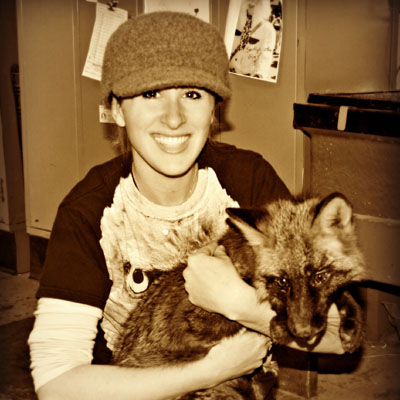“It seemed like a good idea at the time.”
As a liberal arts grad with mountains of debt and molehills of direction, I took an analyst job at a top NYC investment bank. Neck-deep in spreadsheets and working around the clock, I fought to keep my head above water in a sea of brilliant, khaki-clad sociopaths. While the money and education were great, I quickly learned how the finance world really works... and I wanted no part of it. After 9/11, I left for good.
Some work can be done from home, but anything requiring tangible deliverables generally requires you to be in the office. If, for example, you're overseeing the creation of a pitchbook to be distributed at a 10am meeting the following morning, you'll need to wait until the Printing Department cranks them out so you can check for quality assurance. If they finish at 2am and you find errors (which you undoubtedly will), you'll have time to correct them and re-run the job through the Printers. If you'd gone home, only to discover the error at 9am the next morning, you'd be screwed – the Printers can't fix it that quickly.
Fun? It's all in how you define it.
On a micro level, the luxuries and trappings of "being a banker" can make for fun situations, right out of the gate. Consider the life of a first-year analyst, fresh out of college. In a matter of months, he's gone from Natty Light to Dom Perignon, ramen to caviar, and bicycles to chauffeured town cars. I'm exaggerating (though not by much), but the point is that becoming endowed with such luxuries so abruptly and at such a young age, it's hard not become very intoxicated with all of it.
On a more macro level, some people really, really enjoy participating in large transactions. They may not enjoy the grunt-work and long hours, but they love the prestige and adrenaline that comes with high-profile deals. It makes them feel important, gives them fodder for cocktail party conversation, and can make for great learning experiences. And in some rare instances, the transaction could actually help (gasp!) the companies involved.
I don't know the exact numbers, but in my experience, that was not at all true. I'd venture to guess that nearly 10-12% of my analyst class was of Indian decent, and several were among the best analysts by far.
The craziest things typically involved excessive shows of money, ill-advised sexual encounters, high-end drugs, or some combination thereof. For example …
– I once saw a junior banker lose a game of credit card roulette and get stuck with a $3,400 restaurant bill. The steak was good, but for that kind of money he should've been receiving oral under the table.
– At least once a week, co-workers would be discovered mid-coitus in offices, on-site showers, and even janitorial closets. It became so common that after a certain point, it hardly raised an eyebrow. I suppose that when you're in your early 20's and stuck in an office 24/7, you’ve gotta improvise.
– Cocaine was typically the drug of choice and made its way not only into banker nightlife, but also into the offices as well. While the use of cocaine may not seem SO crazy in itself, keep in mind that the vast majority of these young bankers came from straight-laced backgrounds and top schools, and it’s a pretty abrupt change to go from white-hat keggers to white-shoe coke binges in a matter of months.
But if I had to choose one specific crazy story to rule them all, it had to be the time when an extremely high-ranking department head – conservative as they come – threw a high-end S&M party, for no other apparent reason than “he could.” Somehow a handful of pictures emerged afterwards, showing quite a few high-ranking bankers dressed like The Gimp and in all kinds of compromising positions. I didn’t attend so I can’t say just how far things went that night, but it was pretty funny to see them all back in civilian clothing discussing leveraged buy-outs on Monday morning.
Zookeeper and Animal Trainer
 Which cuddly-seeming animals are actually dangerous to be around?
Which cuddly-seeming animals are actually dangerous to be around?
Personal Stylist & Life Coach
 What makes someone qualified to life-coach someone else?
What makes someone qualified to life-coach someone else?
Help Desk Technician
Social skills help in virtually any profession (unless you're a mime, I suppose), and amiability always helps in an interview. But at the analyst level... they're not quite as important. More than anything, banks want analysts who are smart and ridiculously hardworking. Social skills are icing on the cake.
That said, social skills become increasingly important as one moves up the ranks. Whereas analysts are primarily behind-the-scenes workers, higher-ranking bankers are responsible for bringing in new business, and even the most sociopathic know how to schmooze with the best of 'em.
I've answered similar questions elsewhere in this thread, so please feel free to poke around a bit.
Re: age... assuming you want to enter an analyst program, it *could* be an issue. Obviously employers can't legally discriminate on the basis of age, but with rare exceptions, analysts start at 22, right out of college. I guess I just haven't seen enough examples similar to your situation to be able to suggest otherwise.
Gender: not an issue. It might even work in your favor, as banks look to level the playing field.
The so-so school part can definitely be a sticking point, at least for the bulge-bracket banks. But as I said to another question-asker coming from a "meh" school, you should (a) consider starting with smaller, boutique banks (arguably a better working experience, less particular about diplomas, and can act as a springboard), and (b) connect with alumni from your school who have gone the banking route.
Business school may also be an option. B-school graduates who go into banking immediately assume associate positions, so you could side-step the analyst programs altogether.
It's a plus, but probably won't make or break one's candidacy. Obviously a CFA is more likely to have financial fluency than a non-CFA, but speaking from my own experience, I saw very few CFA's in banking. Saw far more CFA's in sales & trading, compliance, accounting, etc.
-OR-
 Login with Facebook
Login with Facebook (max 20 characters - letters, numbers, and underscores only. Note that your username is private, and you have the option to choose an alias when asking questions or hosting a Q&A.)
(A valid e-mail address is required. Your e-mail will not be shared with anyone.)
(min 5 characters)
By checking this box, you acknowledge that you have read and agree to Jobstr.com’s Terms and Privacy Policy.
-OR-
 Register with Facebook
Register with Facebook(Don't worry: you'll be able to choose an alias when asking questions or hosting a Q&A.)